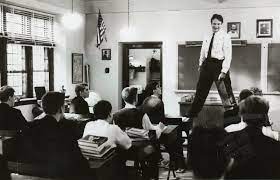
The book Light the Dark: offers some poetic illumination in a Billy Collins essay included in that collection. In it Collins references an earlier essay he wrote called “Poetry, Pleasure, and the Hedonist Reader.”
First, Collins speaks to why he finds W.B. Yeats’ poem “The Lake Isle of Innisfree” so inspiring. He teaches it, for one, and after many years of doing so, decided to commit it to memory (one of the “pleasures” of poetry).
Next he shares an anecdote I could relate to–one involving an MRI (I had my first a few years back and yes, got a poem out of it). Collins said it was “like being buried alive in a very high-tech coffin.” With the help of Yeats, Collins survived his half hour of hell by reciting “The Lake Isle of Innisfree” over and over and over again.
Ah, the medicinal uses of poetry!
From here, Collins gives a little history of poetry before the written word, how its rhyme and meter helped the shamans commit to memory, kind of like how people commit songs to memory today with little effort and through the help of repetition (thank you, radio stations and/or mp3s or whatever people are constantly streaming out of Pandora’s box these days).
Collins claims he seeks the same rhythms in his own free verse, making it a bit less free, maybe. He explains:
It’s hard to describe, though you know it when you feel it. For me, it’s often about gracefulness. I want graceful lines and graceful sentences. I try to write very simply. The vocabulary is simple, the sentences tend to be quite conventional—subject, verb, object. I try to be very unchallenging in syntax. I want the trip to be one of imagination and not completely of the language. But I’m also thinking about the reader, whom I’m trying to guide through an imaginative experience. I want the excitement of the poem—if I can generate some—not to lie in a fancy use of language, or an eccentric use of language. I want the poem to be an imaginative thrill. To take the reader to an odd place, or a challenging place, or a disorienting place, but to do that with fairly simple language. I don’t want the language itself to be the trip. I want the imaginative spaces that we’re moving through to be the trip.
One thing I think we all can agree upon is that some modern-day poetry has lost its way. It is reassuring, therefore, to hear Collins agree. Go get ’em, Billy!:
Poetry’s kind of a mixture of the clear and the mysterious. It’s very important to know when to be which: what to be clear about and what to leave mysterious. A lot of poetry I find unreadable is trying to be mysterious all the time. It’s not so much a mixture of clarity and mystery, instead of a balance between the two. If the reader doesn’t feel oriented in the beginning of the poem, he or she can’t be disoriented later. Often, the first lines of a poem—many times, I find them completely disorienting. But I’d like to go to that place, but I like to be taken there rather than than being shoved into it. It’s like being pushed off the title into the path of an approaching train.
I know from past sermons that Collins believes you should start your books with your strongest poems. It’s advice I’ve tried to take in my own books, only I sometimes worry when my readers point out anything BUT my lead-off batter as their favorites.
That’s how subjective poetry can be. It’s scary, yes, but reassuring, too. Think of it: MANY of your poems, no matter what their seeding in the brackets of your book, can serve as the best and the brightest up front. At least if your readers are to be believed (and who else would you believe more, I ask rhetorically?).
My favorite passage in Collins’ essay speaks to poetry’s “diminished public stature.” Here’s the relevant Collins:
And yet I think poetry is as important today as it’s ever been, despite its diminished public stature. Its uses become obvious when you read it. Poetry privileges subjectivity. It foregrounds the interior life of the writer, who is trying to draw in a reader. And it gets readers into contact with their own subjective life. This is valuable, especially now. If you look around at the society we live in, we’re being pulled constantly into public life. It’s not just Facebook, which is sort of the willing forfeiture of one’s own privacy. The sanctuaries of privacy are so scarce these days. Every banality, from “I’m going out for pizza,” to “JoAnn is passed out on the sofa,” is broadcast to the wide world. I think I read recently that we’re not suffering from an overflow of information—we’re suffering from an overflow of insignificance. Well, poetry becomes an oasis or sanctuary from the forces constantly drawing us into social and public life.
I like that. The gratuitous dis of on-line behavior, especially. “We’re not suffering from an overflow of information–we’re suffering from an overflow of insignificance.”
So why would so many “readers” become addicted to THAT while turning up their noses to poetry? Perhaps we should assign them “The Lake Isle of Innisfree” as a cure? Perhaps they need a “bee-loud glade” or two to realign their perspectives?
I think so. Turning off social networks will slow things down, and that’s the first thing “readers” need to do to appreciate poetry. Slow down. Reread. Luxuriate in language and swim in its sounds to reacquaint yourself with peace, “for peace comes dropping slow….”






